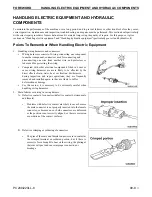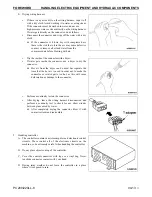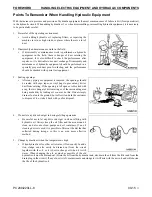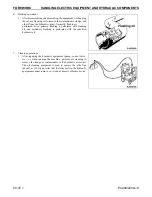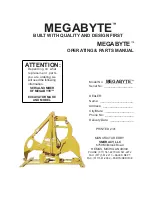
FOREWORD
HOW TO READ THE SHOP MANUAL
PC200/220LL-8
00-7
b
12
HOW TO READ THE SHOP MANUAL
00
Volumes
00
Shop manuals are issued as a guide to performing repairs.
They are divided as follows:
Chassis volume:
Issued for every machine model
Engine volume:
Issued for each engine series
Electrical volume:
Each issued as one to cover all models
Attachment volume:
Each issued as one to cover all models
These various volumes are designed to avoid duplication of
information. Therefore to deal with all repairs for any model,
it is necessary that chassis, engine, electrical and attachment
be available.
Distribution And Updating
00
Any additions, amendments or other changes will be sent to
your distributors. Get the most up-to-date information before
you start any work.
Filing Method
00
1.
See the page number on the bottom of the page. File the
pages in correct order.
2.
Following examples show how to read the page number:
Example:
10 - 3
Item number (10. Structure and Function)
Consecutive page number for each item
3.
Additional pages: Additional pages are indicated by a
hyphen (-) and numbered after the page number. File as
in the example.
Example:
Revised Edition Mark
00
When a manual is revised, an edition mark (
123
…) is
recorded on the bottom outside corner of the pages.
Revisions
00
Revised pages are shown at the LIST OF REVISED PAGES
between the title page and SAFETY page.
Symbols
00
So that the shop manual can be of ample practical use,
important places for safety and quality are marked with the
following symbols.
10-4
10-4-1
Added pages
10-4-2
10-5
Symbol
Item
Remarks
Safety
Special safety precautions are
necessary when performing the
work.
★
Caution
Special technical precautions or
other precautions for preserving
standards are necessary when
performing the work.
Weight
Weight of parts or systems.
Caution necessary when
selecting hoisting wire or when
working posture is important,
etc.
Tightening
torque
Places that require special
attention for tightening torque
during assembly.
Coat
Places to be coated with
adhesives and lubricants etc.
Fill
Places where oil, water or fuel
must be added, and the capacity.
Drain
Places where oil or water must
be drained, and quantity to be
drained.

















